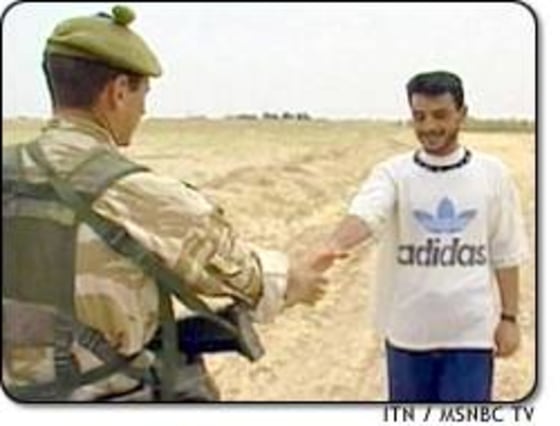Now that British forces seem close to taking control of the city of Basra and the surrounding region, they’re changing their focus to winning over the trust of the Iraqi people, many of whom are wary of the British.
The first British weapon is Radio Two Rivers, a station broadcasting in Arabic in Iraq, pumping out confident military messages to convince Iraqis that Britain is winning the war.
The antennas are pointed straight toward Basra and its 1.5 million people.
Electrical power in the city has been knocked out frequently, but British troops have 5,000 windup radios for eventual distribution to residents.
British officers say it is all part of what they call the “deep battle” for the city, the battle for the hearts and minds of the people.
In a hidden tent in the desert, a military cartoonist finishes a picture showing a British soldier yanking a caricature of Saddam Hussein out of the driver’s seat of a car labeled “Iraq.”
The cartoons are printed on leaflets that are being dropped by the thousands over Basra.
“This time we won’t abandon you,” the leaflets read, referring to the 1991 uprising by Shiites here and elsewhere following the Gulf War. At that time, U.S.-led coalition forces failed to prevent Saddam Hussein from putting down the rebellion and slaughtering thousands of Iraqis.
InsertArt(1852258)Those responsible for getting out Britain’s message say it isn’t
propaganda. “Propaganda is a dirty word for us,” said one, who spoke on condition of anonymity. “It’s absolutely critical that we tell the truth. And the reason that we tell the truth is that it is absolutely critical that we retain credibility with the Iraqi people.”
But on Friday morning, when British troops delivered the leaflets to villagers near the city, some were skeptical.
One man’s family was hiding in a house, scared to be seen in public with British troops. “We like you,” he said, “but don’t trust you. When you leave, Saddam’s men will punish us like in the last Gulf War.”
The British are learning that people in Basra are accustomed to being political pawns and fear it will happen again.
8 KILLED IN BASRA FIGHTING
In fighting in Basra on Friday, British forces said they killed eight Iraqi militiamen in a street battle on the edge of the city. Capt. James Moulton told Reuters that 10 British tanks and armored vehicles entered a shantytown just ahead of their positions on the city’s edge, looking for militiamen, and were fired on.
Moulton said the dead included members of two rocket-propelled grenade teams. He did not say whether any grenade launchers or other weapons had been captured or destroyed.
British troops have refrained from an all-out assault on Basra, instead using brief incursions into the city to try to target Saddam loyalists and gunmen — like those in the shantytown.
Moulton said British troops, who moved about a mile forward on Thursday, were in no rush to storm the city and would continue to put pressure on the militiamen.
“If you just storm the city there is a higher chance of civilian casualties and ‘friendly fire.’ With our approach, we are able to get intelligence from Iraqi civilians who are telling us the number and positions of the militiamen,” he said.
U.N. ASSESSES AID NEEDS
Meanwhile, a team of U.N. officials visited southern Iraq on Friday to assess the need for humanitarian relief. The United Nations believes most families in Basra have enough food to last until the end of April, when rations usually provided under a U.N. oil-for-food plan may run out.
But they are increasingly worried about the lack of clean water in the city.
“Unless people have access to clean, safe water, there will be outbreaks of disease, and diarrheal disease will be the first to come,” said Iain Simpson, a spokesman for the Geneva-based World Health Organization.
UNICEF said it sent water into southern Iraq from Kuwait for the third day running on Friday, dispatching 10 trucks carrying 37,000 liters to the towns of Safwan, Zubayr and Umm Qasr, along with emergency health kits.
The International Committee of the Red Cross said its first two trucks carrying humanitarian relief, including anesthetics, suture threads, intravenous fluids, bandages and blankets, had left Kuwait for four hospitals in Basra.
(Hilary Anderson is a correspondent for ITN. The Associated Press and Reuters also contributed to this report.)
